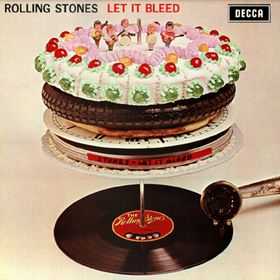So for my 250th post I am going to talk a little bit about one of my favorite albums ever. The Rolling Stones’ Let It Bleed.
I have mentioned this before, but I grew up in a small town with limited radio, almost none of it rock and roll. So my rock and roll education came almost entirely from my parents’ collection. Let It Bleed was one of the five or six Stones albums my parents had, and was the most recent chronologically.
The other albums my parents had were their early blues records. Those are fun records to listen to still, but there’s a huge divide between those and Let It Bleed. In fact, it’s fashionable to divide the Stones’ career between Pre and Post Beggar’s Banquet, and I agree mostly that this is how they should be seen. That was when they really matured as a band. Or when they became irrevocably debauched. In their case it might just be the same thing.
Anyway, also in fashion is to state that the four albums they put out in this era- Beggar’s Banquet, Let It Bleed, Sticky Fingers, Exile on Main St.– are mostly the same level of quality and that picking the best of the four is mostly a matter of taste. I agree with this in theory, but since my parents only owned one of these, Let It Bleed is the best, and it’s grown better as I get older.
When I was a kid it was a collection of crazy songs with a funny cover of a cake made out of junk that’s destroyed on the back cover. I had to get older to know what some of the songs were about. I had to get older than that to understand some of the feelings conveyed in the music.
Let’s review some songs-
I don’t know if there’s much to say about Gimme Shelter that hasn’t already been said. It overplayed and used too often in movies. It’s also one of the best songs of the 60s.
I wasn’t there so who knows, maybe I’m full of it, but I’ve always assumed that the great struggles of the 60s must have taken a toll on a lot of people, and this song captures that. It’s a haunting song. Keith Richards claimed to never like writing topical songs or songs about politics because one day they’d stop being relevant. There is that risk. But sometimes having a song that acts like a time capsule is a great thing too.
And purely in technical terms it’s masterful in how it keeps building in intensity. The Rolling Stones were great at arranging songs to sound like they weren’t actually arranged.
Love in Vain is a nice choice for second- the first so is so intense it’s good to unwind a bit
By this time the Stones could actually do some decent blues. The guitar is really pretty as well.
Country Honk was ruined for me by that scourge of record listeners everywhere- the record skipping.
That ever happen to you? You have a song you like, but somewhere along the way the record gets scratched and that sound of a record skipping every single time at the same point in the song becomes etched into your mind, so that every time you hear the song you cringe, expecting the record to skip? It happens to me, even when I hear it in a format that can’t possibly skip- like the internet
the sweetest ballroom queen I met in Memphis,
in Memphis,
in Memphis,
in Memphis,
in Memphis
Arrrrrrrgh!
Live with Me is the funkiest song on the album
I loved this song and its wild, anarchic sound. I had no idea what it was about. This was my favorite song on the album when I was a kid. So nasty, and such an epic ending when the piano players starts going for it.
Just after that Let It Bleed takes nasty to another level.
Like Love in Vain, this is the song that tones it down a bit after a fast rocker. As a child I knew what breasts were, so I had an inkling of what was going on in the song, even if I couldn’t have said exactly what. I had no idea why Mick was singing so slow. I have a better idea of what he was trying to convey by doing that now.
Midnight Rambler is a song I liked better when I was a kid. It’s just a little too long. I’ve never really cared for You Got the Silver. Oh well, every album has a dud or two.
Monkey Man strikes me as sort of a throwback to when the Rolling Stones were trying to write pop songs, but with an edge to it.
The piano is really pretty. Wikipedia tells me that the other instrument in the beginning of the song is vibraphone. Didn’t know that.
You Can’t Always Get What You Want always struck me as an attempt to provide something uplifting at the end of an album full of danger, fear, cooks who are whores, visiting parking lots for “coke and sympathy” and sticking knives down people’s throats. Like the Stones are trying to make listeners feel better about themselves after their journey to the depths of depravity and I’ve always been grateful for them doing that.
One of the great things about the Rolling Stones is how they can work in so many different genres but always sound exactly like themselves. Like the Stones don’t bend their music to play in other genres, genres bend to make room for the Stones.
…
Anyway, 250 posts feels like a real milestone. I honestly can’t believe I’ve kept at it for as long as I have. It’s been very interesting though, and thanks to everyone who reads this. I’ll try to keep ’em coming!
